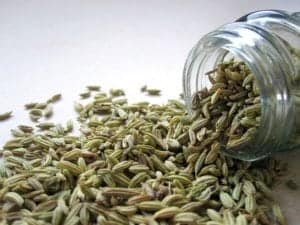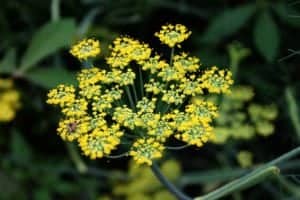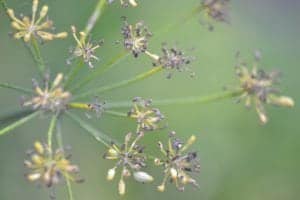Fennel: Herb of the Week
 Winter is the Fennel time of year! Fennel is a warming herb that improves digestion and liver function, which is why you see it in recipes for sausage and other heavy or fatty meats. Fennel is particularly suited to the cold, stagnant digestive conditions that we see so commonly in our culture today. A lot of that cold and stagnant state is attributable to our sedentary culture, and our friend Katy Bowman has a solution for that – a whole advent calendar worth of movement on her Instagram feed! Fennel is a plant of movement too – it can help relieve gas and bloating in adults and kids, and even help with colic in babies. You can add Fennel directly to foods that are likely to cause gas or bloating, or drink it as tea with or after a meal. For babies, a little bit of Fennel tea on a spoon or given by dropper can be quite effective. Fennel is delicious, in dinner or as hot tea afterwards – and I got to wondering if there was such a thing as Fennel cookies. There are! (recipes here, and here – and soon I’ll make a paleo version!)
Winter is the Fennel time of year! Fennel is a warming herb that improves digestion and liver function, which is why you see it in recipes for sausage and other heavy or fatty meats. Fennel is particularly suited to the cold, stagnant digestive conditions that we see so commonly in our culture today. A lot of that cold and stagnant state is attributable to our sedentary culture, and our friend Katy Bowman has a solution for that – a whole advent calendar worth of movement on her Instagram feed! Fennel is a plant of movement too – it can help relieve gas and bloating in adults and kids, and even help with colic in babies. You can add Fennel directly to foods that are likely to cause gas or bloating, or drink it as tea with or after a meal. For babies, a little bit of Fennel tea on a spoon or given by dropper can be quite effective. Fennel is delicious, in dinner or as hot tea afterwards – and I got to wondering if there was such a thing as Fennel cookies. There are! (recipes here, and here – and soon I’ll make a paleo version!)
Soothing and Relaxing
 Another reason we love Fennel: it’s antispasmodic, making it a helpful remedy for intestinal cramping, whether it”™s a bout of indigestion or part of something larger or chronic like IBS. The antispasmodic action is also effective for soothing menstrual cramping. I don’t find it quite as strong as Ginger’s antispasmodic action, but the two make a great pair for when you’re feeling really awful. How should you decide which one is right for you? Well first, if you only have one in your house right now, pick that one 🙂 But if you have both, here’s how I decide: if my tension and cramping is because I am stressed, I usually choose Ginger. If my tension and cramping is because I ate too much, or I ate some kind of processed treat I wouldn’t normally eat, I typically go for Fennel. If I feel like I have constipation in combination with either one of those, I choose both Ginger and Fennel. And if there’s a strong aspect of “Type A” personality in the mix, I’ll add Chamomile. If you’re thinking “OMG, that’s too many options”, just go with all three! Toss them in your teapot: you’ll feel better in no time!
Another reason we love Fennel: it’s antispasmodic, making it a helpful remedy for intestinal cramping, whether it”™s a bout of indigestion or part of something larger or chronic like IBS. The antispasmodic action is also effective for soothing menstrual cramping. I don’t find it quite as strong as Ginger’s antispasmodic action, but the two make a great pair for when you’re feeling really awful. How should you decide which one is right for you? Well first, if you only have one in your house right now, pick that one 🙂 But if you have both, here’s how I decide: if my tension and cramping is because I am stressed, I usually choose Ginger. If my tension and cramping is because I ate too much, or I ate some kind of processed treat I wouldn’t normally eat, I typically go for Fennel. If I feel like I have constipation in combination with either one of those, I choose both Ginger and Fennel. And if there’s a strong aspect of “Type A” personality in the mix, I’ll add Chamomile. If you’re thinking “OMG, that’s too many options”, just go with all three! Toss them in your teapot: you’ll feel better in no time!
Get Your Guts In Shape

One of our students relayed to us:
#guthealtea is one of the very best things you guys introduced me to. I drink it all the time. My blend is Calendula, Plantain, Fennel, Ginger, Mint, StJ, and maybe something else I’m forgetting. So good!
How do YOU best love Fennel?
#herboftheweek
Want to learn more about herbs that can make your life better? Check out our Materia Medica program – it’s a complete herbal toolkit to keep you healthy and strong!

Join our newsletter for more herby goodness!
Get our newsletter delivered right to your inbox. You'll be first to hear about free mini-courses, podcast episodes, and other goodies about holistic herbalism.
